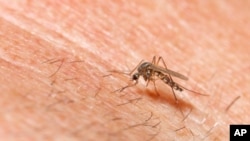A report by the Roll Back Malaria Partnership finds progress is being made in cutting malaria deaths, especially among children in Africa. The Partnership, which is composed of several United Nations and international aid agencies says many lives are being saved because of the widespread distribution of insecticide treated mosquito nets and the use of combination therapies or ACTs.
The United Nations designated Decade to Roll Back Malaria ends this year. The Partnership, which is working to reduce cases and deaths from this disease, calls 2010 a milestone year for malaria control.
Today, the United Nations reports 860,000 people still die from malaria. Most of these deaths occur among children in Africa. While this number is unacceptably high, Jan Van Erps of the Roll Back Malaria Partnership Secretariat, says this still indicates an improvement.
"For years, we have been saying to you one child is dying every 30 seconds….Well, today…we are saving a life every two to three minutes," Van Erps said.
The Partnership notes more lives are being saved now because global malaria funding increased 10 times from 2004 to 2009 to nearly $1.8 billion. In addition, there has been a big increase in global production of insecticide treated nets to 150 million and a huge advance in the procurement of artemisinin-based (an herb that works against drug resistant strains of malaria) combination therapies to 160 million.
Representative of the Global Fund for AIDS, Tuberculosis and Malaria, Stefan Embled says the Fund is providing 70 percent of the money for anti-malaria programs in 83 countries, most in Africa.
"In at least 10 endemic countries in Africa, there are declines in new malaria cases and an impressive decline in malaria-related child mortality of between 50 and 80 percent," Embled said.
But, many problems remain in fighting this deadly disease. Andrea Bosman is with the World Health Organization's Diagnostics, Drugs and Resistance Program. He says access to life-saving treatment remains relatively poor.
"Many of the children, the most vulnerable groups, when they have fever, they seek malaria treatment and receive very often non-ACT treatment," Bosmansaid. "So, sub-standard medicines or highly inefficacious medicines. We have a major problem, especially in the private sector. In the private sector, there is a lot of sub-standard medicines, inefficacious anti-malarias and a large use, unfortunately of mono-therapies. And, we know from the experience of other medicines that the large use of mono-therapies promote the development of drug resistance."
The Roll Back Malaria Partnership says it believes many countries can achieve the Millennium Development Goal of cutting in half the number of malaria deaths by 2015. But, only, if the world remains committed to providing the money needed to ensure universal coverage of malaria control interventions.
